Final Fantasy XI
Or: What I did on my holidays (in Vana'diel).
Some promises were never meant to be kept.
I promised myself when Square released Final Fantasy XI in Japan that I wouldn't be interested in it. Certainly, it's Final Fantasy, and I'm an unrepentant Square fanboy, but regardless - I loathe massively multiplayer online RPGs. Early brushes with the genre, in the form of the hideously ugly looking EverQuest and the even uglier effects it had on those of my friends who chose to play it, convinced me that this genre was not for me. The ability to turn a previously pleasant and interesting individual into a complete bore who could speak intelligently about nothing but his latest exploits in Norrath didn't strike me as much of a selling point for the game, and everything I heard about the gameplay sounded tedious and uninteresting.
I never wavered in my resolve. When all around me fell to Dark Age of Camelot, I turned my nose up at the prospect of joining them. When Star Wars Galaxies claimed them, I confidently predicted that they'd be taking the red pill as soon as the "but it's Star Wars!" sheen wore off, and I wasn't wrong. MMORPGs, I opined to those who would listen, are the crutch of a feeble mind, the sort of game played by a person who is fundamentally rubbish at dealing with the real world, or bearded weirdos who salivate over complicated statistics and endless levelling treadmills.
I could have kept the promise. I could have held my head high as I walked along the streets, knowing that whatever else I may be, I wasn't an MMORPG nerd. That would have made me better than the legions of EverQuest players boring their friends to death with in-depth discussions of +3 Rods of Beating, the hordes of Dark Age of Camelot fans tucked away in their bedrooms away from the cruel light of the sun, the rather small and pathetic bunch of Anarchy Online players desperately trying to convince the world that their game doesn't suck. But like many a strong mind convinced that winners don't do drugs, it turned out that all I needed was a dealer with the right words to ease my misgivings and convince me that maybe trying just once wouldn't be so bad... I guess my promise wasn't to be kept after all.
The First One Is Always Free

Those crafty Japanese boys and girls at Square knew exactly which buttons to press. As the American release of Final Fantasy XI on the PC approached, they cooed sweet nothings into my ear, assuring me that everything would be okay. "Look," they said, "everyone else is having such a good time. We've ironed out most of the problems from the Japanese launch, and added lots of new content. Two hundred thousand Japanese people can't be wrong, can they? They love it, they enjoy it ever so much, this fantastic Final Fantasy XI stuff. Just give it a try; it can't hurt, can it? If you don't like it, you don't have to keep doing it - you can just cancel the subscription. That's right. It's perfectly safe..."
And then there were the screenshots. This is Final Fantasy alright; a fantasy world called Vana'diel, filled with the kind of imagination and attention to detail that we've come to expect from Square Enix. It has rolling plains, and fantastic cities, and detailed character models running around. It has tall graceful Elvaan, lithe catgirls called Mithra, and cute little sorcerers called Tarutaru. It has moogles - in fact everyone in the game has a moogle, who looks after their personal house for them and even waters their plants if they're doing a spot of indoor gardening. It has airships. It has chocobos. I was sold. After all, it couldn't hurt to just try it? The Final Fantasy name has never failed me before...
Even so, I had my misgivings as I took hold of the hefty box of my US import and wandered up to the counter with it, casting sideways glances for fear that someone might see what I was buying. The transaction was almost over, when the red-haired chap behind the counter peered briefly at the back of the box and announced happily, "ooh, I bet you get really hooked on this. Everyone says it's great." My nerve failed me. I grinned - a look which I'm sure must have looked like the rictus of a man condemned to death - muttered something along the lines of "Oh, well, it's Final Fantasy, I mean I don't like massively multiplayer games... hah..." and fled the shop, my purchase a guilty weight in the pocket of my coat.
Just Try It, You'll Like It, Really
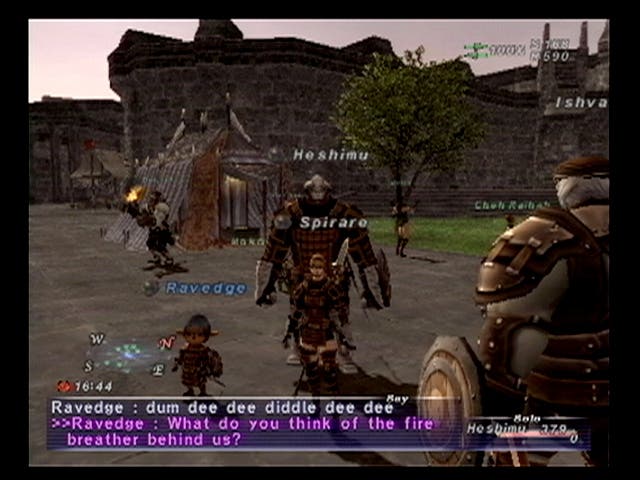
Upon arriving home, I opened the box - one of the heaviest game boxes I've ever encountered, I might add - and out into my lap popped a total of five (count 'em!) discs, a selection of leaflets suggesting that should I win the lottery or inherit a fortune from an uncle I never knew I had, I might want to buy an Alienware PC to celebrate - or failing that, that I should bear in mind that NVIDIA cards are the way it's meant to be played. Last but certainly not least, the cause of all that excess weight slid from the box - a hefty 144-page manual which was, over the next week, to become a bible for my very life.
The first install disc installed PlayOnline, Square Enix' custom online service. This is worthy of a special mention, being a very clever little piece of software indeed. Sadly it's restricted to a relatively small window on your desktop (a fullscreen option would be great), but it's got a built in email system, instant messenger, information browser and even downloadable background music, wallpaper and so on. The PlayOnline client integrates tightly with FFXI, so you can add people to your friend list or see who's online from within the game itself, by virtue of the fact that your character in the game is associated with a specific PlayOnline identity. It's a very slick piece of software and while I'd expected using a custom interface to launch the game to be annoying, it's actually a pleasure to use.
The next three discs give you Final Fantasy XI itself, and the fifth and final disc installs Rise of the Zilart, a bonus pack for the game which was sold separately in Japan but is bundled for free with the US versions of the game because Square Enix love us and want to cherish us and lavish their affections upon us. Or perhaps because they thought we'd be a bit miffed at having to pay an extra twenty quid for something that already existed when they released the title, and might in fact go so far as to call them a bunch of thieving cads. Whichever way the thinking went, it's there, it's free and once you reach a high level in the game, it lets you play as a samurai, a ninja or a dragoon (complete with pet dragon wandering around after you), so it's all good.
The Excitement is Mounting
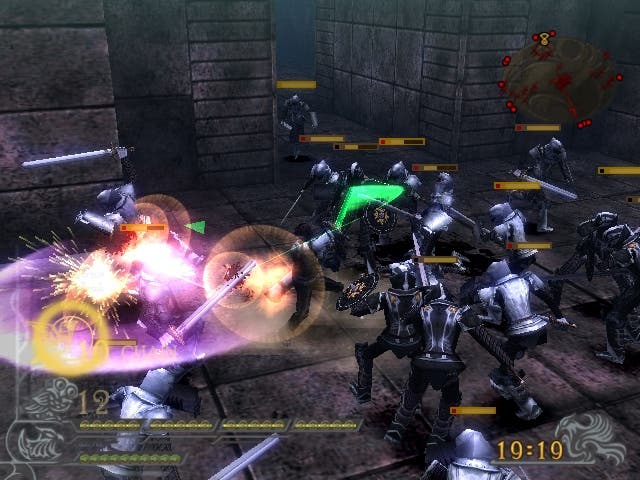
Once through the install process, I cracked my knuckles and was ready to go. Into PlayOnline I hopped. "Whisk me away to Vana'diel," I cried, as I clicked merrily on the "Games" button in the interface. "Checking for Updates," came the response - the PlayOnline client obviously not getting into the spirit of the moment, but never mind, eh? About five minutes later, I was beginning to fret, because this whole checking for updates lark was still ongoing, and I was no closer to my chocobos and moogles. Then came the hammer blow. "Downloading Updates," my helpful client application informed me. "Two hours forty minutes remaining." Oh.
Let's be clear here - this is nearly three hours of downloading over a half-megabit ADSL connection, so it's safe to say that modem users might want to set this one going before taking a nice long holiday in the sun (not, I suspect, that the game is playable on a dial-up connection anyway, but I'm sure you'd guessed that already). Okay, I was a little bit miffed at the delay, but I have to confess that by now I was, to my own growing horror, getting very into the whole affair. I was whistling the rising and falling chords of the Final Fantasy signature tune to myself - that's a bad sign. I passed the three hours reading a book, sipping a whiskey and listening to a recording of the Final Fantasy orchestral performance in Tokyo a few years ago, occasionally glancing up to peer at the progress bar. Then, at last, it was done - and it was time to journey to Vana'diel!
After the stunning and genuinely stirring intro video had rolled - another triumph for Square's fabulously talented rendered video department, and a fantastic opener to the story of the game - there was one last hurdle, namely character creation. Final Fantasy XI offers you a choice of five distinct races - Hume (humans, generic all-rounders), Elvaan (tall Elf-like characters, good swordsmen), Tarutaru (small cute cuddly types who make fantastic magical characters), Mithra (catgirls with excellent agility) and Galka (huge hulking furry guys with massive strength), and all you really have to choose at this point is your race, name and appearance. I picked a Hume character and after significant faffing around trying to find a free name, landed on Sousuke. Then it was off to Vana'diel with me at last - on a server called Fairy, no less. No sniggering at the back, please.
Brave New World
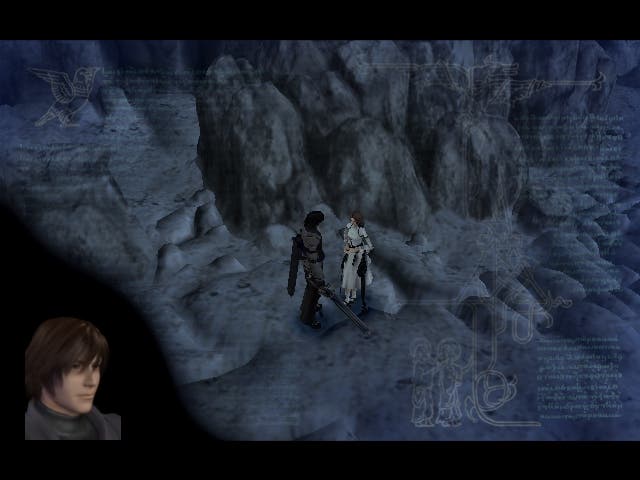
You select from three different locations to start the game, and this effectively pledges your allegiance to one of the three countries in Vana'diel. I chose to start off in Windurst, the leafy green capital city which is mostly home to the Tarutaru and the Mithra - my other choices were the Elvaan city of San'doria, which is all castle walls and tall spires, or the overgrown mining town of Bastok, a centre for technology and home of the Humes and the Galka. Your city is your home point; each sprawling metropolis is filled with shops, homes and official buildings, and generally teeming with people - both players and non-player characters. Your choice of city is important, not just because of the location on the world map of each city, but also because it determines the quests and missions which will be open to you from the beginning of the game - and the storyline you'll follow as a citizen of each city is different.
Upon entering the city of Windurst, I was greeted with a cut-scene which introduced two Tarutaru characters to me, and told me a little bit about my surroundings - while also giving me my first quest, namely bringing an item to a guard near the residential area, which he would swap for some gil (in-game currency) to get me started on my way. This also helpfully led me to the residential area itself, where every player has their own individual room with a pet moogle who's happy to mind your items for you, and performs a variety of other useful functions. You can decorate your room with furniture or paintings later in the game, to give it that personal touch, although unfortunately you don't seem to be able to bring other people to your room. Doubly a shame if you've just bought a nice bed...
At this point I have to confess that I was feeling a little overwhelmed with options. There were hundreds of NPCs wandering around that I could talk to, I was hopelessly lost in what seemed like a very large city, and I wasn't sure what the etiquette on talking to other players was, or whether it was safe to just walk out of the city and start hitting things. Thankfully, I located some friends in the game and had them talk me through the basics, but I did feel that Square Enix could have put in a little more friendly hand-holding through the early stages of play. As it transpired, what I really needed to do was to go outside the city and start blatting things - and, helpfully, both of the zones directly accessible from the city are beginner zones, where there's very little danger of running into anything you can't deal with.
First (K)night
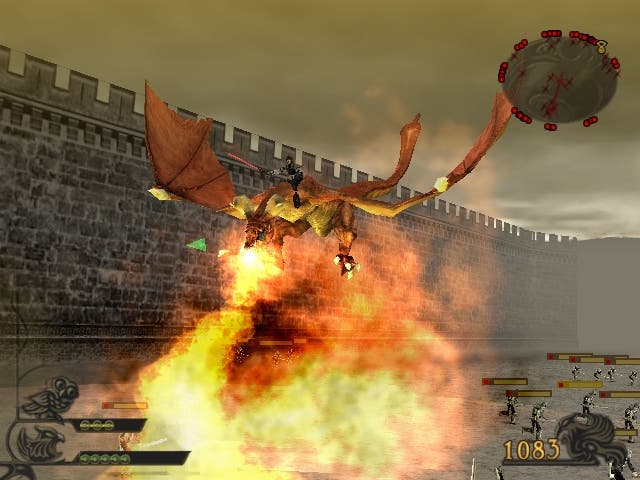
So began my first day in Vana'diel. Actually, it was quite a few days - the game runs on a day-night cycle which only lasts a few minutes of our time, and the in-game time affects a number of things - including, in some places, the type of monsters that spawn, with more difficult creatures (like skeleton warriors or ghouls) coming out at night. The cycle also gives the hugely impressive game engine a chance to show off its best work, as the sun and moon rise and set over the beautifully crafted lands in which you'll play, and a ton of artistic special effects come into play.
The first area I ventured into was Sarutabaruta, a pair of huge rolling plains criss-crossed with rivers, pathways and rocky outcroppings just outside the city of Windurst. Although I'd been somewhat disappointed to notice that my in-game character was far lower detail than he'd first appeared on the character creation screen, any misgivings about the in-game graphics faded away as I battled the detailed creatures (typical low-level RPG fare - rabbits, walking mushrooms, crows...) that inhabit the plains, and watched other players cast stunning magical attack spells or, even more enticingly, ride past me on huge chocobos, on their way to higher level zones further away from the city or perhaps even on a journey to another city entirely.
Better yet, the game was saving its graphical excellence greedily, and only releasing it to me little by little as I played. Even now, after nearly fifty hours in the game, I'm only scratching the surface of what it's capable of - and although I'm occasionally reminded that this was originally a PS2 graphics engine by little flaws like very visible pop-up in the distance and odd aliasing on textures, the fact remains that this sunset over Sarutabaruta is one of the most beautiful things I've ever seen in a videogame, and a party of six players battling giant wild animals while the sun filters through a thick dust storm in the dry valleys of Tahrongi is quite a sight to behold.
In Plane Sight
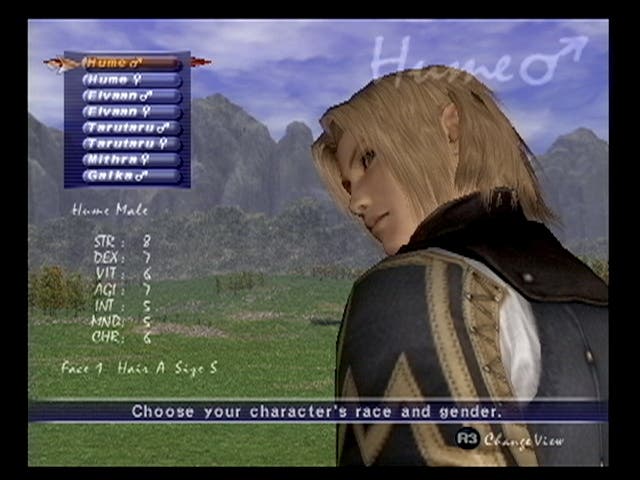
After beating up plenty of rabbits and mushrooms (mandragora, technically) in the inner reaches of Sarutabaruta, I returned to my house and my pet moogle - satisfied that I'd had fun, but painfully aware as I walked through the bustling city that I still really wasn't sure what on earth was going on in the game. I'd made no money from any of the creatures I'd fought, so I was still stony broke and using my default equipment, and I really wasn't sure where I was going with my character - having started as a Warrior class simply because, well, big swords rock. Time to read the manual. In fact, so involved was I with the game at this stage - so taken with the world Square Enix had created for me to immerse myself in - that I slipped the manual into my bag as I packed for a weekend of boozing in Dublin, and read it practically from cover to cover on the plane there and back. Right. With some of the game mechanics laid bare properly to me for the first time, it was time to get stuck in.
The most important thing I discovered - and something I like very much about the game - is that it gives you a huge amount of choice about how you play, and actively encourages you to explore a wide variety of different roles. Although I started as a Warrior, I'm free at any time to ask my moogle to change my job - to a White Mage perhaps, or a Monk, or a Thief - and embark on levelling up that job class. Best of all, although I start at level one in whatever new job I choose, I don't lose levels in any of my old jobs - I can return to them at any time and resume from where I left off, and my single character can have multiple different levels in multiple different job types.
Indeed, this is a positive advantage as the game progresses. At a certain point in your progress, you'll have the option of completing a quest to open up a "sub-job" ability, which allows you to select a job to go alongside your main job. This secondary job can be up to half the level of your main job, and grants you all the abilities of that secondary job - so, as an example, a level 20 Warrior who also has level 12 White Mage abilities could select White Mage as his sub-job, this effectively making him into a combination of a level 20 Warrior and a level 10 White Mage, with great combat skills as well as basic healing abilities. Further into the game the job system diversifies even more, with the addition of new job classes to choose from such as Summoner, Samurai, Beastmaster and Dragoon - so there's a lot to keep you interested, no matter what class you start as.
100 per cent Natural Ingredients
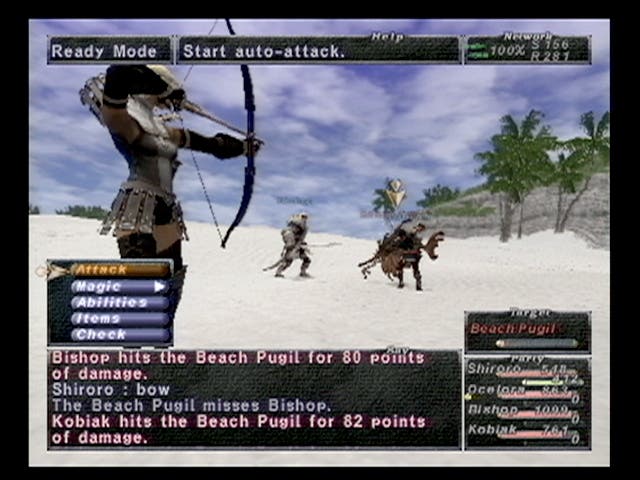
The other interesting depth to the game which I discovered from the manual was the synthesis process and the auctioning system - an aspect of FFXI which effectively gives it a hugely complex and dynamic player-driven economy. Rather than buying items from the shops in the game, the centres of commerce are the Auction Houses - locations at which you can place your hard-won items up for sale or bid on other people's items in what is effectively an in-game version of eBay. Most of the items on sale haven't been won in combat, either - they've been created through a process of synthesis, in which players with a suitable level of skill combine simple items with crystals (powerful magical objects awarded when you defeat certain creatures while taking part in your nation's conquest campaign) to create more complex items. I personally haven't touched the synthesis process yet, and have only experimented with the Auction Houses in order to sell my spoils or buy new weapons and armour, but the game economy and manufacturing system is a massively deep and interesting one which is just another option I could explore should I tire of killing monsters.
Not that that's likely to happen any time soon, because after about twenty hours in the game - just as straightforward monster-killing was beginning to grow a little dull - I discovered the most important aspect of all, and one which no manual could ever describe. While randomly taking out some creatures with my level 9 Warrior at the entrance to Tahrongi canyon, the next level of difficulty up from the Sarutabaruta zones, I received an invitation to join a party from a friend who was online at the time. Fair enough, I thought - having taken part in some small-scale party action previously, several game levels ago. I was quickly hooked up in a group with two black mages, two white mages, and two warriors, all bar one of them complete strangers to me - and there followed what can only be described as a revelation about how FFXI works.
While Square Enix may well be the masters of the single-player, solitary experience, they set out with Final Fantasy XI to tear that up and build something totally different. Early in the game you play effectively solo, surrounded by others but not really playing with them, because you're just learning the ropes - but around level 10, some 20 hours or so into the game, everything changes. Playing solo is not only unsatisfying, it just doesn't work any more, because each class is too specialised to have everything it takes to defeat an enemy of any scale. You're forced to play in a group, to act socially, to think and work as part of a team - and this is the point where FFXI truly comes to life.
Team Player
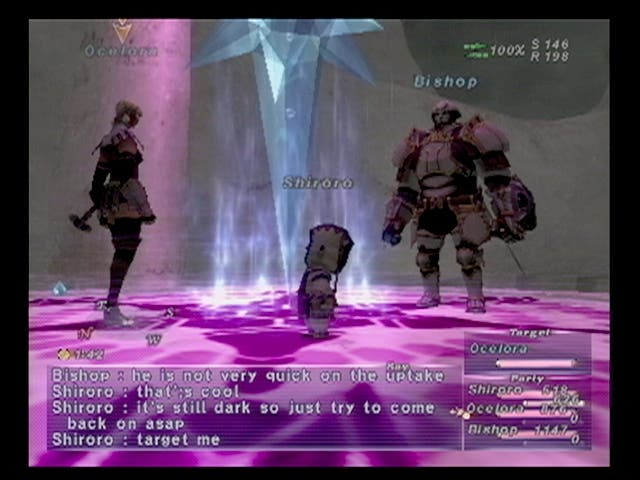
While my previous experiences with online games (and I've had a lot of them) meant that the idea of hooking up with complete strangers to play as a team left me somewhat cold, FFXI has surprised me again and again with just how well this works. Never once in the time I've been playing have I ended up with a group that didn't work, or that was full of morons. Each time I've joined with five of my companion players to take down prey that no individual among us could handle, the groups have been chatty, sociable and even educational, as everyone has something of their experiences in Vana'diel to share that the others haven't heard before. It certainly helps that a mix of cultures is represented in the game - there are no dedicated US servers (although lag has never been an issue for me - Square obviously have an incredible infrastructure for the game), so American and Japanese players mingle freely with the handful of Europeans who have imported the game, and parties often represent a happy mix of three continents.
Through the medium of the parties I've joined, I've discovered fascinating new depths to the combat system. As well as the obvious team elements of battling in a party, where everyone has their role and they must fulfil it or the party will be defeated (a painful consequence that loses experience points for everyone), the game has many other subtleties that make working in a party interesting and challenging. While it's easy to see that Warriors would be expected to bear the brunt of an enemy's attacks to guard the weaker mages, in return for which the White Mages heal the Warriors and the Black Mages blast the enemy, what's less obvious is the use of status effect magic or provoking commands. Even less obvious - but more rewarding - is the skill chain system, which allows players to execute their special moves in a certain order and timing in order to do massive damage (and earn massive experience points) from chain effects, or the XP chain system - whereby defeating several difficult enemies in a row grants an XP bonus with each one.
If standard combat isn't blowing your skirt up at any point, there are always quests. Many NPCs in the towns will ask you to fetch certain items or perform certain tasks for them, and will reward you handsomely for doing so, while the town guard on the gates will give you quests to accomplish which may involve adventuring through dungeons (there are large indoor dungeons below many of the playing areas) or to new areas in the game, and will generally advance the plot with a sequence of Final Fantasy styled cut-scenes and dialogue exchanges. Some of these missions can be done solo, but many of them work better in a group - and they're a great way to follow through the game with a group of friends who are at the same level as you are.
Surface Tension
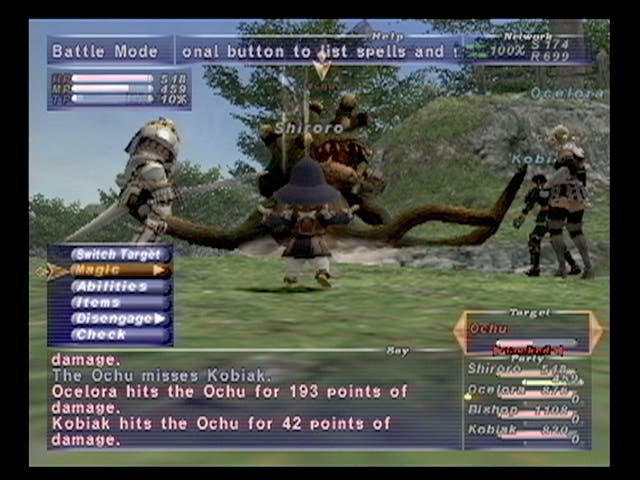
After nearly fifty hours of playtime, I'd expect to be nearing the endgame of a Final Fantasy console title, thoroughly attached to the characters and their plight, and achieving complete mastery of the battle system, while looking forward greatly to the inevitable amazing ending cut-scene and the afterglow that comes with the completion of a fantastic storyline. Not so FFXI. After fifty hours in the game, I feel like I have only scratched the surface of what Square Enix has to offer. I've reached level 13 with a single character class, and even with that class, I'm only beginning to understand the possibilities open to me in party combat, and I've only completed the first few missions and quests out of dozens available to me. Never mind that - I've only visited one of the cities in the game, and only a tiny fraction of the areas, and yet even at that I regularly find myself looking around slack-jawed at the detail and majesty of the world I've been given to play in.
Is this what other MMORPGs are like? Friends who have played them claim that while the similarities are there, I'm not wrong in believing that Final Fantasy is very different indeed. The game introduces a host of new ideas and mechanics to the genre, many of them heavily influenced by the eastern RPGs from which it takes its name and its inspiration, and it certainly seems to be attracting a radically different audience from EverQuest or its ilk. I'm not the only MMORPG virgin to have my cherry popped by Square Enix' sweet seduction; the vast majority of the players I've spoken to in the game are also playing a massively multiplayer title for the first time, having come to Final Fantasy XI as fans of the Final Fantasy series rather than as fans of the MMORPG genre.
Verdict!?
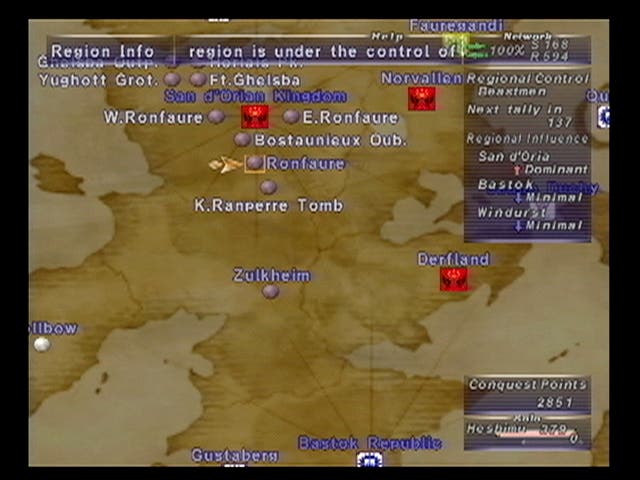
This isn't a review. That much should be obvious by now. It's unlikely that Eurogamer will ever publish a review of Final Fantasy XI, simply because reviewing the amount of content available in this game would be almost impossible - and because offering a review of what is, essentially, a game whose experience is unique to every player depending on the other players they meet and the way they choose to play, seems an eminently pointless task. Instead, I've tried to describe my first week in Vana'diel, how the game has appeared to me and how it has changed the perception I approached the entire genre with.
I know that I'm not alone in my general feelings about MMORPGs, and I certainly know that I'm not alone in being a massive fan of Square Enix' RPG titles. To put this as bluntly as I can - I didn't expect to like FFXI. I wanted to play it because it was Final Fantasy, but I expected the mechanics of a massively multiplayer RPG to put me off it rapidly. I certainly had no intention of continuing to play beyond the free month which you get with the game when you purchase it (each additional month of play costs an eminently reasonable $4.95, around £3.60 in real money).
However, the fact is that I'm hooked on the world of Vana'diel, and intrigued by the possibilities it offers. I'm massively enjoying playing with new people and making new friends in the game world, and I'm delighted with the high level of social interaction in the game - even as simple as people who know each other from a successful night's hunting in a group waving at each other as they rush past on a city street. There's still a vast amount for me to see and do, as new jobs become available, and new areas of the world become safe for my strengthening Warrior to visit, and I expect that I'll be enjoying my progress through the delights which Square has prepared for many months to come.
This is a beautifully polished example of a massively multiplayer videogame, teeming with interesting content and carefully thought out gameplay structures, and set in the kind of deftly realised fantasy world that Square Enix has made itself famous for creating. It's a truly worthy addition to the Final Fantasy series, and any fan of that series would be mad to miss out on it because they don't believe they'll like an online version of the game.
As for me? I guess that promise was never meant to be kept after all. I'll see you in Vana'diel.






.png?width=291&height=164&fit=crop&quality=80&format=jpg&auto=webp)


